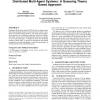Free Online Productivity Tools
i2Speak
i2Symbol
i2OCR
iTex2Img
iWeb2Print
iWeb2Shot
i2Type
iPdf2Split
iPdf2Merge
i2Bopomofo
i2Arabic
i2Style
i2Image
i2PDF
iLatex2Rtf
Sci2ools
ATAL
2005
Springer
2005
Springer
An autonomous performance control framework for Distributed Multi-Agent Systems: a queueing theory based approach
Distributed Multi-Agent Systems (DMAS) such as supply chains functioning in highly dynamic environments need to achieve maximum overall utility during operation. The utility from maintaining performance is an important component of their survivability. This utility is often met by identifying trade-offs between quality of service and performance. To adaptively choose the operational settings for better utility, we propose an autonomous and scalable queueing theory based methodology to control the performance of a hierarchical network of distributed agents. Categories and Subject Descriptors C.4 [Performance of Systems]: Design studies, modeling techniques, performance attributes General Terms Performance Keywords Multi-Agent Systems, Survivability, Queueing Models
Related Content
| Added | 29 Jun 2010 |
| Updated | 29 Jun 2010 |
| Type | Conference |
| Year | 2005 |
| Where | ATAL |
| Authors | Nathan Gnanasambandam, Seokcheon Lee, Soundar R. T. Kumara |
Comments (0)

